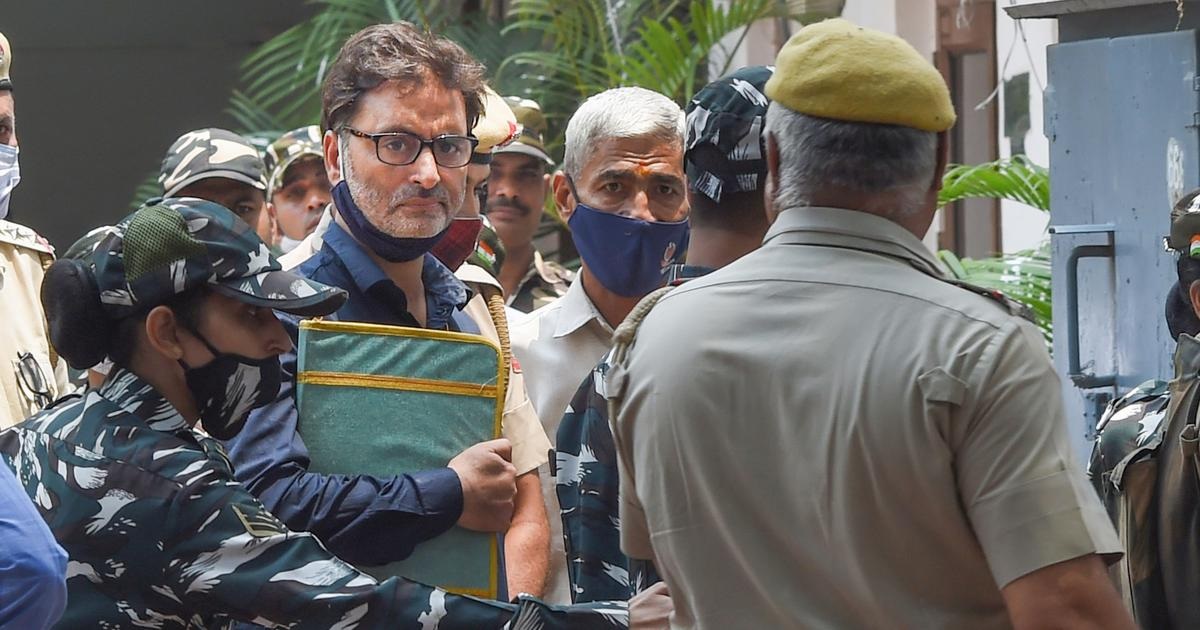
New Delhi: The National Investigation Agency (NIA) approached the Delhi High Court on Friday, seeking death penalty for terrorist Yasin Malik, who was sentenced a life term by a trial court in a terror funding case a year ago, asserting not giving capital punishment to such a ‘dreaded terrorist’ will result in a miscarriage of justice.
The plea by NIA has been listed for hearing on May 29 before a bench of Justices Siddharth Mridul and Talwant Singh. On May 24, 2022, a trial court in the national capital awarded life imprisonment to Malik, the Jammu Kashmir Liberation Front (JKLF) chief, after holding him guilty of various offences under the stringent anti-terror law-Unlawful Activities (Prevention) Act (UAPA)- and the IPC. Yasin Malik had pleaded guilty to the charges, including those under the UAPA.
In its petition before the high court for enhancement of Malik’s penalty, the NIA said if such ‘dreaded terrorists’ are not given capital punishment on account of having pleaded guilty, there will be complete erosion of the sentencing policy, and terrorists would have a way out to avoid capital punishment. A life sentence, the NIA asserted, is not commensurate with the crime committed by terrorists when the nation and families of soldiers have suffered loss of lives. The trial court’s conclusion that Malik’s crimes did not fall within the category of the ‘rarest of the rare cases’ for grant of death penalty is ‘ex-facie legally flawed and completely unsustainable’, the anti-terror probe agency said.
It emphasised that it has been proved beyond reasonable doubt that Malik spearheaded terrorist activities in the Valley, and with the help of dreaded foreign terrorist organisations, had been ‘masterminding, planning, engineering and executing armed rebellion in the Valley in an attempt to usurp the sovereignty and integrity of a part of India’. ‘Not giving capital punishment to such dreaded terrorist will result in miscarriage of justice, as, an act of terrorism is not a crime against society but it’s a crime against the entire nation; in other words it’s an act of ‘external aggression’, ‘an act of war’ and an ‘affront to the sovereignty of nation’,’ the plea said.
‘Offences committed by the respondent accused are ex-facie acts of ‘external aggression’, brazenly planned and executed by ‘acts of waging war against the nation whereby ‘internal disturbance’ was created through raising and using trained armed militia within the state and by helping trained terrorist, raised in enemy states, to infiltrate the borders of India to participate and catalyse such internal disturbances’, it stated. The NIA claimed there are no mitigating circumstances in favour of Malik and the present case falls within the category of ‘rarest of the rare’ for imposition of death penalty.
The trial court, which had rejected the NIA’s plea for capital punishment, had said the crimes committed by Malik struck at the ‘heart of the idea of India’. ‘These crimes were intended to strike at the heart of the idea of India and intended to forcefully secede J&K from UOI. The crime becomes more serious as it was committed with the assistance of foreign powers and designated terrorists. The seriousness of crime is further increased by the fact that it was committed behind the smokescreen of an alleged peaceful political movement’, the trial court had said. It had, however, noted the case was not the ‘rarest of rare’, warranting the death penalty. The maximum punishment for such an offence is death penalty.
The life term was awarded for two offences – section 121 (waging war against the government of India) of IPC and section 17 (raising funds for terrorist act) of the UAPA. According to the Supreme Court, life imprisonment means incarceration till the last breath, unless the sentence is commuted by the authorities. The court had awarded Malik a 10-year jail term each under sections 120 B (criminal conspiracy), 121-A (conspiracy to wage war against the government of India) of IPC and sections 15 (terrorism), 18 (conspiracy for terrorism) and 20 (being member of terror organisation) of UAPA. It had also awarded five-year jail term each under sections 13 (unlawful act), 38 (offence related to membership of terrorism) and 39 (support given to terrorism) of UAPA.
The court had framed the charges against Kashmiri separatist leaders including Farooq Ahmed Dar alias Bitta Karate, Shabbir Shah, Masarat Alam, Md Yusuf Shah, Aftab Ahmad Shah, Altaf Ahmad Shah, Nayeem Khan, Md Akbar Khanday, Raja Mehrajuddin Kalwal, Bashir Ahmad Bhat, Zahoor Ahmad Shah Watali, Shabir Ahmad Shah, Abdul Rashid Sheikh and Naval Kishore Kapoor. A charge sheet was also filed against Lashkar-e-Taiba (LeT) founder Hafiz Saeed and Hizbul Mujahideen chief Syed Salahuddin, both of whom have been declared proclaimed offenders in the case and are living in Pakistan.

Post Your Comments